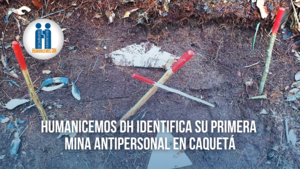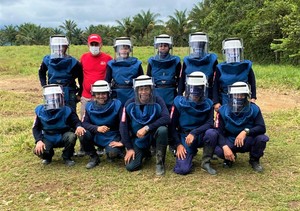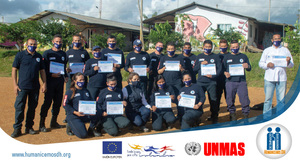
Montañita, Colombia Yeimy starts her mornings similar to how she used to when she was a FARC-EP combatant in the mountains of Antioquia, getting up at five o’clock in the morning, making her bed, drinking a cup of coffee and heading for an early class before the start of her military duties. Only now she is living in Aguabonita, one of the 26 “Territorial Spaces for Training and Reintegration,” encampment-size zones around the country, and the class she is taking is part of a course on internal quality management for humanitarian demining.
Yeimy is among the estimated 7,000 FARC-EP fighters who turned over their weapons to a United Nations mission last year, as part of the peace agreement between the Colombian Government and the guerilla organization, putting an end to over 50 years of bloody internal conflict. However, the peace deal received only tepid support at home.
The initial agreement failed to receive a majority of votes in an October 2016 referendum, forcing a hasty renegotiation and the ratification of a revised accord by Congress the following month. But peace in the country remains the overall goal: for Yeimy and many alike, the agreement is something favorable, especially for those who were directly involved in the conflict. As she notes, the majority of those affected were the poor. “The peace agreement is good for us” she says placidly.
The legislation required to implement the peace agreement experienced significant delays impacting on some of the commitments made to reintegrate the ex-combatants. Former FARC-EP fighters languished in the Territorial Spaces as their main skills were related to warfare. There has been and continues to be a high risk of either recidivating or engagement with lucrative illicit activities for which their competencies would be valued and useful, leaving the door open to making the country unstable again.

As part of an individual assistance programme, each former combatant is getting a monthly stipend of $220 for two years, but this stipend is soon to expire. During this subsidized period, former FARC-EP members have received basic education, benefited from short vocational training programmes and participated in farming projects, gaining new skills useful for their reintegration. But the reintegration programmes progress slowly, and some ex-combatants have already left the 26 Territorial Spaces.
However, a collective corporation started by former FARC-EP combatants is hoping to change the tide. Humanicemos Desminado Humanitario (DH)’ is a humanitarian mine clearance organization headed by two women, Marcela Moreno and Ángela Orrego, both former members of FARC-EP. In a project funded by the United Nations Peacebuilding Fund through its Colombia Post-Conflict Multi Partner Trust Fund and implemented by the United Nations Mine Action Service (UNMAS) and partners, Humanicemos trains former combatants in mine clearance techniques and management. “This project is a safe route to achieve economic and social reintegration of ex-combatants”, explains Orrego, assistant director of the organization.

As part of the peace process, [las FARC] [FARC] agreed to give information and assist on the demining of the territories across the country and it was a natural progression to have us [ex-combatants] also be the ones working to clear the territories of the mines we laid,”
says Uberley Turberquia, 43, Chief of Operations of Humanicemos DH in Aguabonita, Caqueta.
Apart from creating opportunities for socio-economic reintegration, Humanicemos DH also contributes to mine action clearance results and reparation to local communities – a holistic support to consolidating peace in Colombia.
“This is a unique opportunity for us [las Naciones Unidas] [the United Nations] to help build a demining organization from scratch, to apply all the knowledge and experience we have accumulated over the years and contribute to this peace process and to this country.”.
Lina Castillo is one of the instructors and experts of the United Nations Mine Action Service which accompanies this transition.
For Uberley, the challenges ahead are daunting, but after surviving 26 years as a FARC-EP fighter, he has endured it all. He was the part of FARC’EP´s Western Bloc. He was the part of FARC’EP´s Western Bloc. With peace and a better life in mind, he is now dedicating his life to using the leadership skills gained from his past towards a constructive and positive future. “In war, everything is paid with a life, we made many sacrifices on both sides, but now it is time to rebuild and contribute to a better Colombia”, said Uberley when asked how he feels about taking on this challenge.
Uberley sees his role in Humanicemos DH as an opportunity to grow personally but to also give a new opportunity to the former combatants. “Right now, we have close to 600 applications from former insurgents who want to join Humanicemos DH, I think it is a good sign for us that former combatants are starting to see humanitarian demining as a future career”, explained Uberley. “This programme is really life-changing not only for former combatants, but also for the communities that were affected by the conflict,”
adds Humanicemos director Marcela Moren with some emotion.

Back in Aguabonita, a steady rain and fog continue to descend. Yeimy takes her eight-year-old son by the hand to avoid getting in the way of the men hustling through the construction site for what will be the regional headquarters of Humanicemos DH. The base is expected to be inaugurated in late June with the start of four training cycles for the 80 former combatants that will be the initial work force of this organization in the framework of the project implemented by the United Nations Mine Action Service.

Yeimy is in charge of reviewing the final touches, such as installation of evacuation and office signs. Having joined the FARC-EP when she was only 20, she had never had a stable paid job before. Now, through Humanicemos, she dreams of becoming a field technical manager one day. “This is where we are going to make a difference”, she says, as she looks forward to a “Colombia in peace”.
****
Font:



